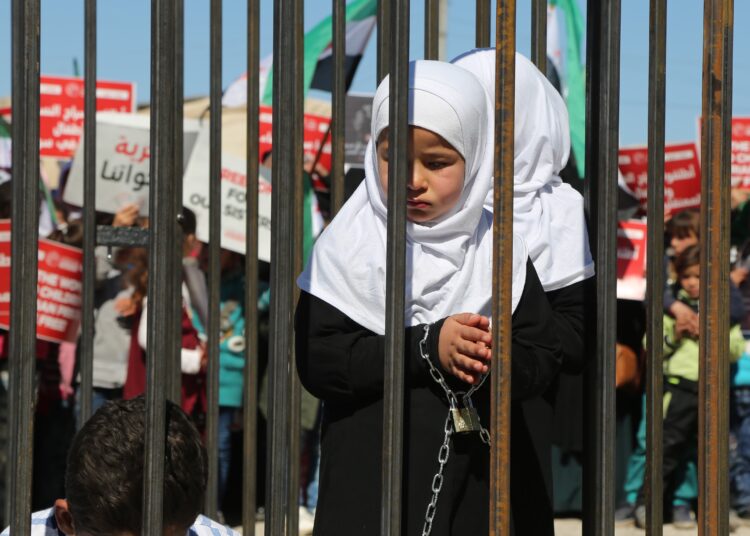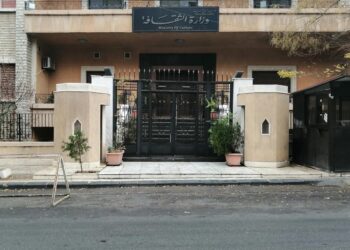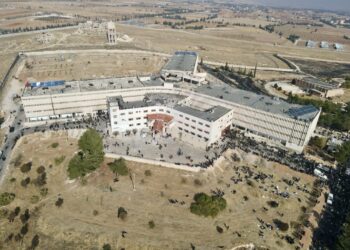Bashar al-Assad’s Syria uses arbitrary detention as a systematic policy to silence dissent from Syrians brave enough to call for political change.
I should know, the organisation I founded, the Syrian Network for Human Rights, has been documenting cases of arbitrary detentions since the 2011 Syrian Revolution.
From 2011 to 2023, we documented at least 1.3 million cases of arbitrary detention, of which at least 156,757 of those arrested — including 5,235 children and 10,205 women — are still under arrest or remain forcibly disappeared.
The Syrian regime is responsible for 88% of the total number of arrests, making it the worst perpetrator and the only one to use arbitrary detention as a systemic method and a centralised policy.
And let me be clear, arbitrary detention is synonymous with forced abductions and enforced disappearances, with the regime’s playbook a well-oiled machine.
Inside Syria’s sham courts
The vast majority of arrests, almost 98% of the total number committed, are carried out without judicial warrant or change. The authorities do not identify themselves and those detained are barred from familial contact or a lawyer. The detainees are taken to unknown destinations and cut off from society.
Once detained, Syrian citizens are tortured and are forced to make confessions — of crimes they did not commit — under extreme distress in kangaroo courts that more resemble state security branches than seats of justice.
Based on these worthless ‘confessions’, detainees are then tried in either the Counter-Terrorism Court or the Military Field Court, established by the Syrian regime to eliminate dissidents and political opponents. In no way do either meet the preconditions for a free and fair trial.
That’s if they even get to trial. In the vast majority of cases, no judicial rulings, no charges and no trial are ever brought. Less than a quarter of those arbitrarily detained are referred to these ‘courts’.
This whilst facing conditions of overcrowding, malnutrition, medical negligence, and any contact from the outside world — not that the regime in Syria cares.
Since 2011, they’ve sought to sugar-coat and legitimise its systematic practice of arbitrary detention by issuing 20 fake ‘amnesty’ decrees to those referred to the Counter-Terrorism Court or the Military Field Court.
But, as I’ve already explained, more than 75% of those arbitrarily detained don’t make it to court, making it impossible for them to meet the criteria. As such, these so-called amnesty decrees are reserved for those that the security services want to release. At the Syrian Network for Human Rights, we believe that this entire process is closely monitored by the Syrian regime, which has a solid decision-making structure.
The worst is yet to come
Today arbitrary detentions continue, and although the Syrian regime is the most notable and frequent culprit, other parties to the conflict including the Kurdish-led Syrian Democratic Forces and extremist Islamist groups have carried out such arrests.
The phenomenon of arbitrary detention and the accompanying torture and enforced disappearance are thus among the most significant obstacles that prevent the return of refugees and displaced persons.
From early 2014 to March 2024, the Syrian Network of Human Rights documented at least 3,532 cases of arrest, including 251 children and 251 women, who had returned to their original place of residence in Syria.
The regime was responsible for all of these arrests. Of those detained, 2,149 have since been released while 1,383 are still under arrest, with 969 of these being classified as forcibly disappeared.
Despite our continued work, all efforts to secure the release of tens of thousands of Syrian citizens unjustly detained have failed. Even the International Committee of the Red Cross has not been able to periodically visit detention centres.
And although the issue of arbitrary detention is present in various UN texts on Syria, not enough pressure has been exerted by the international community and the UN on the Assad regime or other parties to release political detainees, women and children.
Not a single detainee has been released that Assad’s regime has not wanted to release. As such, we’ve been left frustrated and in despair: Assad’s impunity on the international stage is damaging our work at the Syrian Network for Human Rights. We are convinced that we’ve missed a massive number of arbitrary cases. Our numbers, therefore, are the bare minimum.
So long as Assad is in power, and the international and Arab community continues to shield his crimes, the true number of those who sit in arbitrary detention will remain unknown.
And based on all our evidence, we can only conclude that the worst is yet to come, with arbitrary arrests now commonplace for anyone who dares to express their opinion and direct the slightest criticism, no matter how minor, against Assad’s Syrian regime and its barbaric practices.






